What good is fame, if I can't speak for the people: Badhan
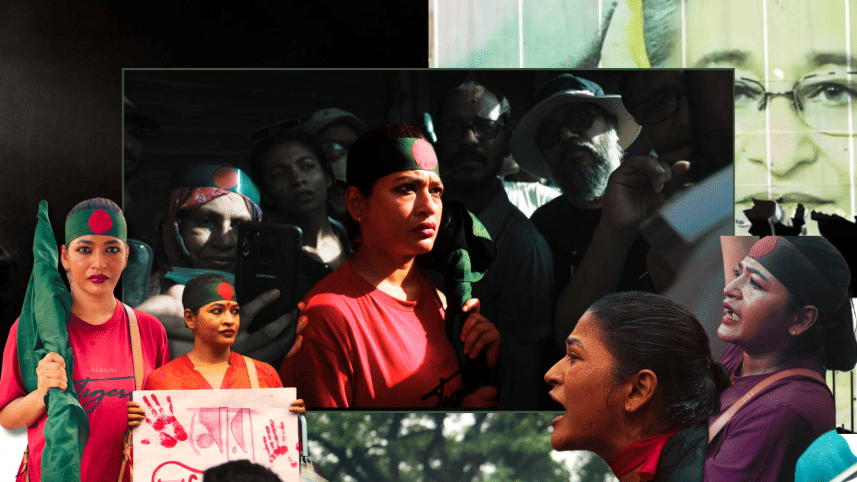
"The state that fires upon innocent civilians and issues arbitrary orders for mass arrests cannot truly embody democracy," her voice trembled as she spoke through the megaphone.
"My daughter might have been among those children killed in the protests; I could have been among those harmed. This government has failed to protect us and must be held accountable. If I take to the streets to assert my rights, no one should use violence against me. I demand my rights. I have no passport to another land; this country is my home. I refuse to live under oppression, and I will not let my children grow up in such a hostile environment. This country is ours, and together we will bring about change," declared Azmeri Haque Badhan as the artistes rallied in demand for justice on August 1.
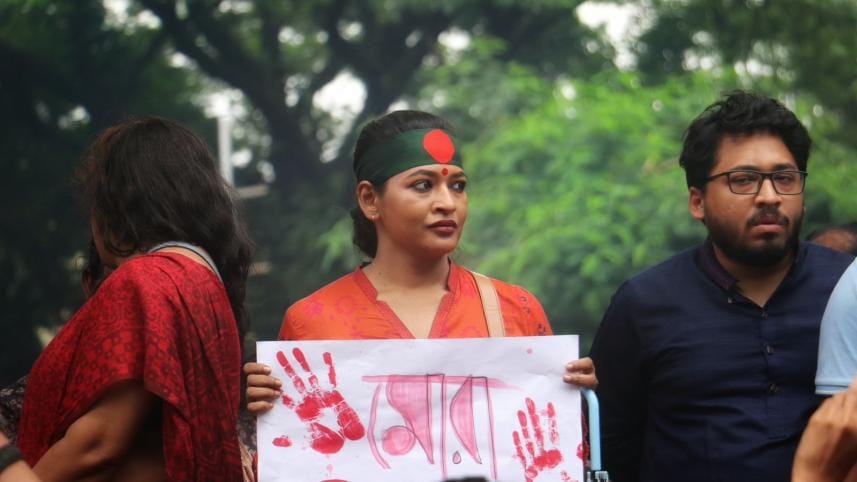
As the rain soaked her through, cascading like tears from a grieving sky, it did nothing to dampen the searing fury and sorrow that burned deeply in her heart on that day. Adorned in a black salwar kameez with a bright red scarf draped around her neck, her eyes blazed with fierce determination as she denounced the horrific acts sanctioned by the tyrannical regime.
Her journey toward justice was strewn with thorns—she was given death threats and assaults of acid, yet her unshakable spirit remained resolute. Though fear whispered its menacing warnings, Badhan understood that to confront her deepest fears was to embrace a cause far greater than herself, a cause that sought to heal and uplift her beleaguered society.

During the protest, many netizens criticised the silence of celebrities. Badhan, tormented by depression, simply couldn't comprehend herself into penning her emotions at that time. Yet, the tragic losses of Abu Sayed and Riya Gope profoundly shook her, causing her to let go of her fear and break free from the shackles of oppression.
"Abu Sayed's and Riya Gope's deaths devastated me. Amid the protests, my daughter and father would often loiter around the terrace while we were confined indoors. The helicopters' fires could have claimed their lives, or I might have been the mother who perished at the window. The thought broke my heart, leaving me unable to write or speak during those times," she revealed.

Later on, the internet shutdown took place but the former government was soon forced to resume the broadband connection. At that time, Facebook, WhatsApp, and Instagram were switched off and thus people started using VPNs.
"On July 25, I changed my profile and cover photos to black, replacing a previous image with former prime minister Sheikh Hasina. Many warned me that this act and using a VPN might lead to arrest. On July 26, I posted: 'The accountability system of our democratic country has been shattered. As a Bangladeshi citizen, I am devastated, traumatised, and unsafe.' Despite threats of arrest under the Digital Security Act (DSA), I was determined to speak out," she said.

On July 27, director Akram Khan urged artistes on a WhatsApp group which consisted of 900 people to support the student protests. While younger actors were eager, many seniors hesitated, fearing arrest if they supported the nine-point demand. The platform, titled "Drissho Madhyam Shilpi Shomaj" (Visual Artiste's Society), decided to protest in front of Sangsad Bhaban.
"When we arrived at Kamarbari, the police forbade us from protesting at Sangsad Bhaban without permission. When Mamunur Rashid bhai arrived, the DC preferred to negotiate with him, thinking he might be more pliable, but we pressed on and successfully held our procession at Farmgate. Despite being barred from displaying placards and banners, I was supported by Rajib bhaiya, Piplu bhai, Dhrubo bhai, Akram bhai, Monem bhai, and Lima apa.
On August 3, students consolidated their demands to a single point: the resignation of Sheikh Hasina.
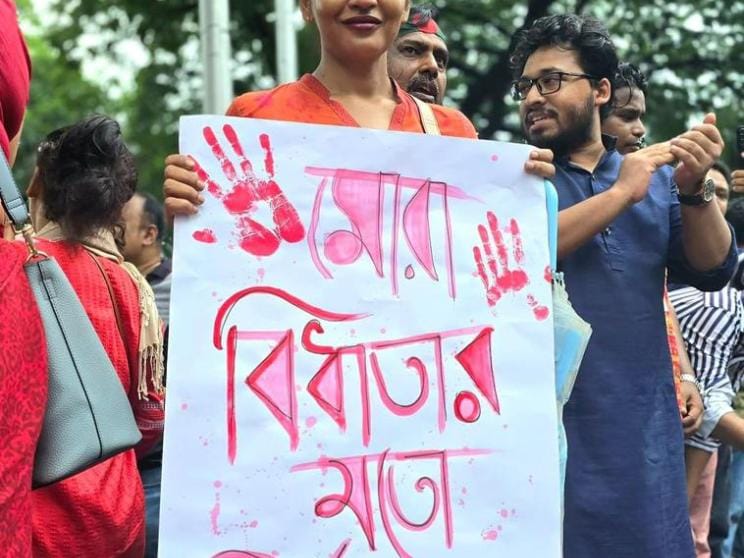
"I received numerous threats, including one to throw acid on my face. As an actress, my appearance was crucial, but they sought to intimidate me. When police tried to block students in front of Shahbagh police station, I intervened, standing in their way and insisting the protest continue. The strict curfew on August 4 deeply distressed me, fearing that the former PM might not resign despite the danger. My family was anxious and begged me to stay home on August 5, but I promised to attend the march disguised in a burka," said the "Esha Murder" famed actress.
Badhan walked from Mirpur 11/5 to Banani, reaching around 1:30pm. "Upon learning that Sheikh Hasina had fled, I discarded my burkha and hijab, wrapped myself in the Bangladeshi flag, and joined my friends in Banani, Kamal Ataturk," she shared.
The support and love Badhan received from the students were overwhelming for her. "One memorable moment was when a girl, upon recognising me at Shaheed Minar, embraced me and cried, expressing that my presence was crucial to the protest. Such moments are unforgettable," revealed Badhan.
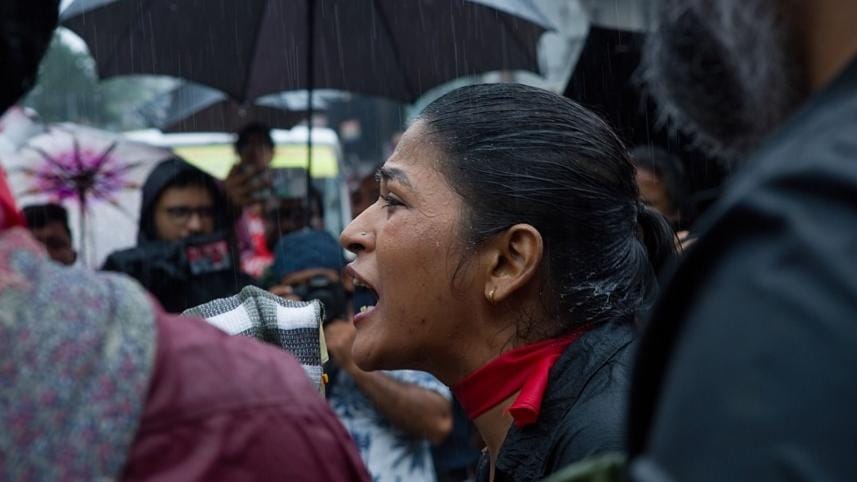
After the country's liberation from fascism, widespread looting and vandalism targeted Hindu homes and temples. Indian media, however, falsely portrayed the situation as "mass genocide" and "widespread rape of Hindu women" linked to the student protests.
To counter these false claims, Badhan spoke with Kolkata media to explain the truth. Despite her efforts, manipulated videos of her circulated on X, falsely alleging that Hindu women were being coerced to convert to Islam or leave the country. In response, she posted:
"I must address the blatant lies and propaganda spread by Indian media and far-right groups about Bangladesh. As a proud Bangladeshi, I'm sharing my video from a recent protest where I advocated for student rights and condemned the Hasina regime. Yet, Indian media continues to distort the truth, spreading falsehoods and escalating tensions by manipulating videos like mine."

"In the past few days, I've done my best to present my perspective, talking with various Kolkata-based channels. Despite this, they continue pushing a narrative involving the former PM and her son, likely for political reasons that I'm unaware of. My Indian friends in Kolkata frequently check on me for updates, and Tabu ji has also expressed concern for my safety. I've tried to clarify the situation from my viewpoint," the actress stated.
Regarding the new interim government, Badhan is hopeful for significant reforms, particularly the scrapping of the DSA, which the former PM used to harass journalists, actors, directors, and cartoonists. "The torture Nawshaba faced in 2018 was unjust and horrible. They tried to control artistes by threatening them with similar treatment. I deeply regret the injustice Nawshaba suffered; she was blacklisted and even denied housing. As an artiste, I strongly condemn such acts," affirmed the "Khufiya" actress.




 For all latest news, follow The Daily Star's Google News channel.
For all latest news, follow The Daily Star's Google News channel. 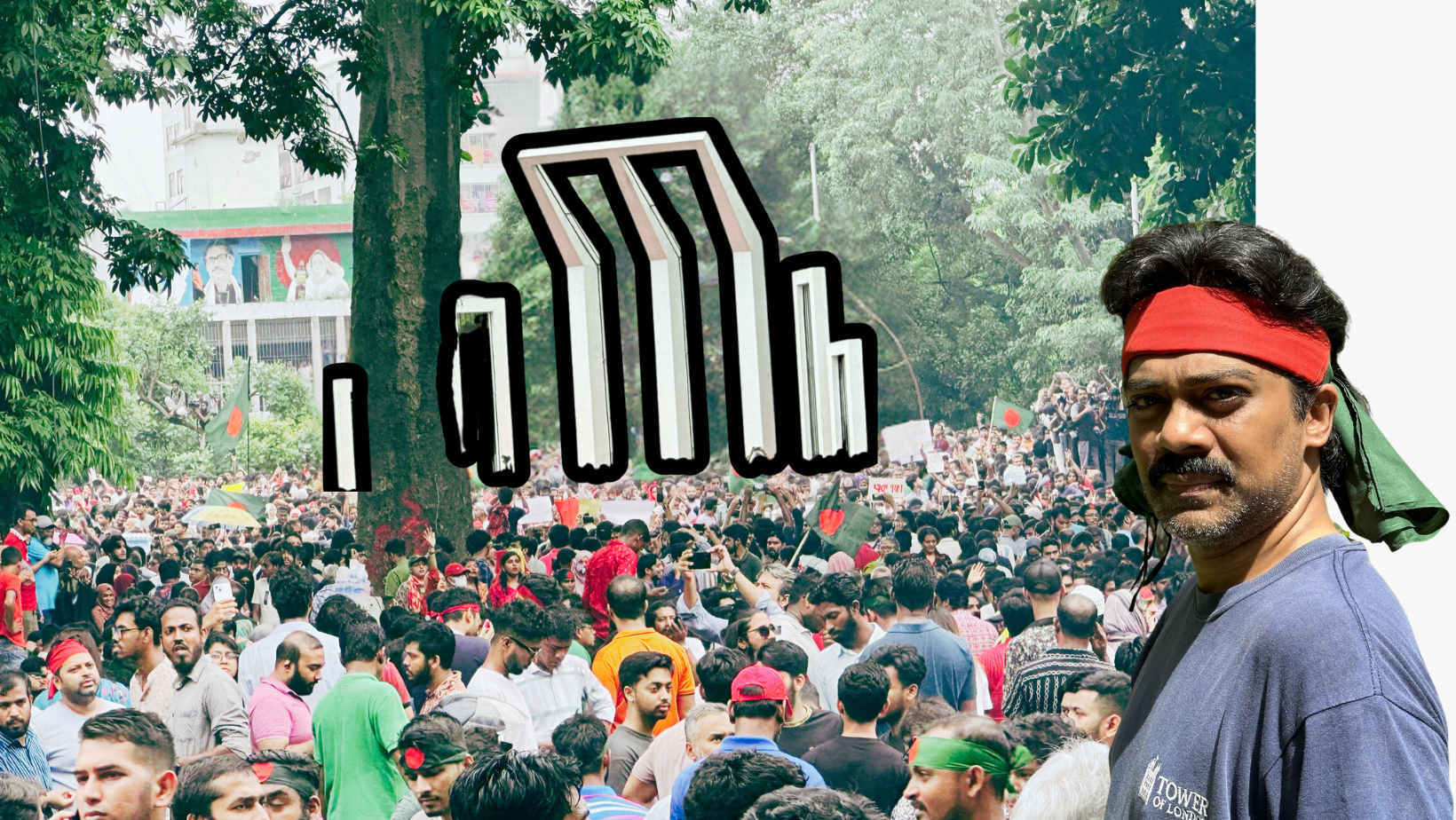
Comments